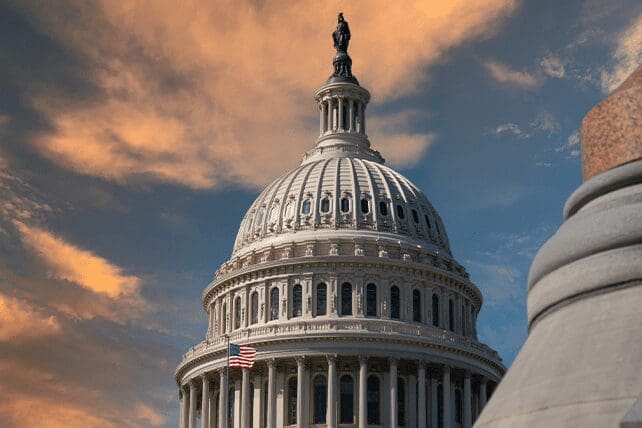WASHINGTON (BP)—The U.S. Senate took the first and an apparently decisive step Wednesday (Nov. 16) toward codifying same-sex marriage into law with the aid of more than one-fifth of Republicans in the chamber.
Senators voted 62-37 to invoke cloture, as the procedural move is known, and thereby bring up for a final vote the Respect for Marriage Act (RMA). All 50 Democrats and 12 Republicans voted in favor of the motion, which needed 60 votes to succeed. The bill would repeal the 1996 Defense of Marriage Act (DOMA) and require federal and state recognition of same-sex marriages considered legal in the jurisdiction where they took place.
The Senate is expected to vote soon to approve passage of the RMA, which will require only a majority and will serve as a watershed, congressional redefinition of the institution of marriage if enacted.
The House of Representatives approved the RMA in July, when 47 GOP members joined all Democrats in a 267-157 vote. The Senate legislation, however, includes amendments to the House-approved bill that primarily attempt to address religious liberty concerns, though critics say they fall short. If senators pass the measure, another vote by the lower chamber would be required before it can go to the White House. President Biden is expected to sign it into law.
If enacted, the RMA would largely serve as the legislative version of the U.S. Supreme Court’s 2015 Obergefell v. Hodges decision that legalized gay marriage.
Despite amendments regarding religious freedom, the Southern Baptist Ethics & Religious Liberty Commission (ERLC) – as well as other defenders of the biblical view of marriage and conscience rights – has remained opposed to the RMA.
“It is disappointing to see a majority of our U.S. Senators vote in support of a bill that goes directly against God’s design for our most foundational institution — the family,” ERLC Policy Manager Hannah Daniel told Baptist Press. “The ERLC will continue to oppose the Respect for Marriage Act as it moves ahead and, if signed into law, will work to address the serious religious liberty ramifications from it.
“In a time where Congress has no shortage of important concerns to tackle, our representatives should prioritize solutions for the pressing issues facing the American people rather than divisive bills that harm people of faith,” she said in written comments.
The amended bill still “does not provide adequate protections for religious liberty,” Daniel said in a post on the ERLC’s website Wednesday. “Through reiterating the protections that already exist in the law and using unhelpfully vague language, the amendment appears to offer people and institutions of faith more additional protection than it actually does.”
The Religious Freedom Institute said the Senate amendments “purport to protect religious freedom, but in fact do not.”
While same-sex marriage is the focus of consideration regarding the RMA, the bill’s language prohibits denial of the recognition of marriage between two people on the basis of their “sex, race, ethnicity, or national origin.” The U.S. Supreme Court invalidated state bans on interracial marriage in its 1967 Loving v. Virginia decision.
The Religious Freedom Institute protested what it described as the RMA’s juxtaposition of same-sex marriage and race. “In short, the RMA is discriminatory to its core,” the institute said in a three-page analysis of the proposal. Even with the amendments, the RMA’s premise remains – “namely that opposition to same-sex ‘marriage’ is akin to racism. That claim is not only false but profoundly disingenuous. There is no real or perceived threat to marriage based on race in any state in America.”

